infinite不定式
- 格式:doc
- 大小:55.50 KB
- 文档页数:6
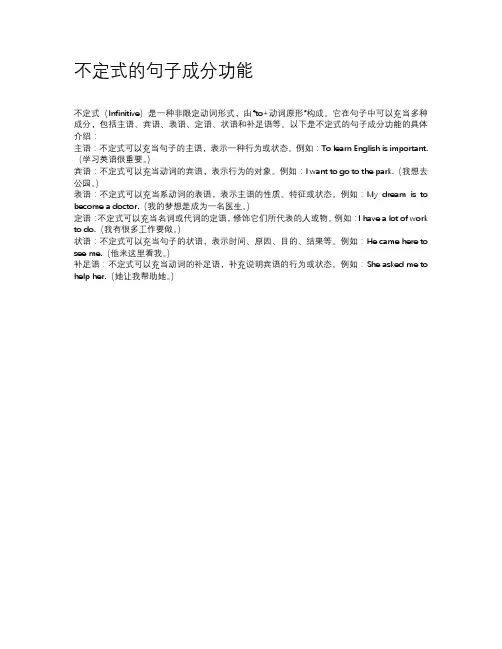
不定式的句子成分功能
不定式(Infinitive)是一种非限定动词形式,由“to+动词原形”构成。
它在句子中可以充当多种成分,包括主语、宾语、表语、定语、状语和补足语等。
以下是不定式的句子成分功能的具体介绍:
主语:不定式可以充当句子的主语,表示一种行为或状态。
例如:To learn English is important.(学习英语很重要。
)
宾语:不定式可以充当动词的宾语,表示行为的对象。
例如:I want to go to the park.(我想去公园。
)
表语:不定式可以充当系动词的表语,表示主语的性质、特征或状态。
例如:My dream is to become a doctor.(我的梦想是成为一名医生。
)
定语:不定式可以充当名词或代词的定语,修饰它们所代表的人或物。
例如:I have a lot of work to do.(我有很多工作要做。
)
状语:不定式可以充当句子的状语,表示时间、原因、目的、结果等。
例如:He came here to see me.(他来这里看我。
)
补足语:不定式可以充当动词的补足语,补充说明宾语的行为或状态。
例如:She asked me to help her.(她让我帮助她。
)。

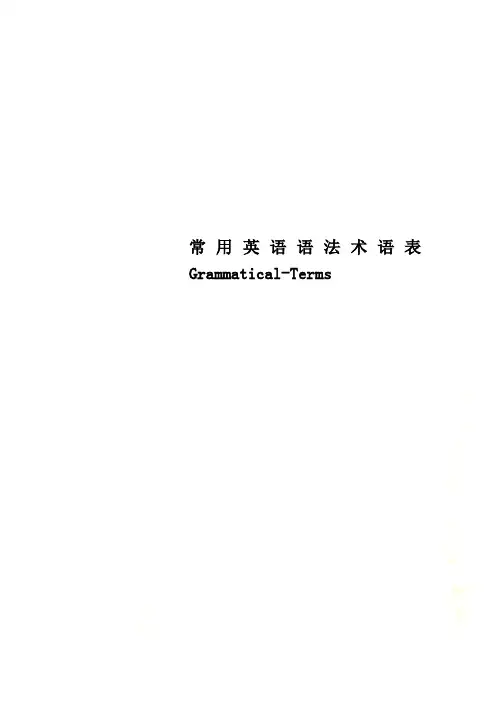
常用英语语法术语表Grammatical-Terms常用英语语法术语表Grammatical Terms 1. 语法grammar句法syntax词法morphology结构structure句子sentence从句clause词组phrase词类part of speech实词notional word虚词structural word单纯词simple word派生词derivative复合词compound词性part of speech名词noun专有名词proper noun普通名词common noun可数名词countable noun不可数名词uncountable noun抽象名词abstract noun具体名词concret noun物质名词material noun集体名词collective noun个体名词individual noun介词preposition连词conjunction动词verb主动词main verb及物动词transitive verb不及物动词intransitive verb 系动词link verb助动词auxiliary verb情态动词modal verb规则动词regular verb不规则动词irregular verb 短语动词phrasal verb限定动词finite verb非限定动词infinite verb使役动词causative verb感官动词verb of senses动态动词event verb静态动词state verb感叹词exclamation形容词adjective副词adverb方式副词adverb of manner程度副词adverb of degree时间副词adverb of time地点副词adverb of place修饰性副词adjunct连接性副词conjunct疑问副词interogative adverb关系副词relative adverb代词pronoun人称代词personal pronoun物主代词possesive pronoun反身代词reflexive pronoun相互代词reciprocal pronoun指示代词demonstrative pronoun疑问代词interrogative pronoun关系代词relative pronoun不定代词indefinite pronoun物主代词possecive pronoun名词性物主代词nominal possesive prnoun形容词性物主代词adjectival possesive pronoun冠词article定冠词definite article不定冠词indefinite article数词numeral基数词cardinal numeral序数词ordinal numeral分数词fractional numeral形式form单数形式singular form复数形式plural form限定动词finite verb form非限定动词non-finite verb form 原形base form2.morphology词法notional实词form word虚词word-building构词法root词根prefix前缀suffix后缀synonym同义词antonym反义词conversion转化法derivation派生法affixation词缀法composition合成法compound复合词parts of speech词类noun名词pronoun代词numeral数词adjective形容词verb动词adverb副词article冠词preposition介词conjunction连词interjection感叹词particle引导词classification of nouns名词的分类common noun普通名词proper noun专有名词collective noun集合名词material noun物质名词abstract noun抽象名词countable noun可数名词personal pronoun人称代词possessive pronoun物主代词reflexive pronoun反身代词demonstrative pronoun指示代词interrogative pronoun疑问代词relative pronoun关系代词indefinite pronoun不定代词reciprocal pronoun相互代词case格nominative case主格objective case宾格possessive case所有格singular form单数形式plural form复数形式cardinal numeral基数词ordinal numeral序数词fraction numeral分数数词degrees of comparison比较级positive degree原级comparative degree比较级superlative degree最高级notional verb实义动词modal verb情态动词link verb连系动词auxiliary verb助动词transitive verb及物动词intransitive verb不及物动词regular verb规则动词irregular verb不规则动词finite verb限定动词non-finite verb非限定动词person人称number数gender性tense时态voice语态mood语气principal forms of verbs动词的主要形式present form现在形式past form过去形式participle分词present participle现在分词past participle过去分词infinitive不定式gerund动名词verbal noun动名词simple present tense一般现在时simple past tense一般过去时simple future tense一般将来时present continuous tense现在进行时past continuous tense过去进行时future continuous tense将来进行时past perfect tense过去完成时future perfect tense将来完成时present perfect continuous tense现在完成进行时future perfect continuous tense将来完成进行时sequence of tenses时态的呼应passive voice被动语态active voice主动语态indicative mood陈述语气imperative mood祈使语气subjunctive mood虚拟语气adverb of time 时间副词adverb of place地点副词adverb of manner方式副词adverb of degree程度副词adverb of frequency频度副词conjunctive adverb连接副词definite article定冠词indefinite article不定冠词coordinating conjunction并列连词subordinating conjunction从属连词syntax句法declarative sentence陈述句imperative sentence祈使句exclamatory sentence感叹句interrogative sentence疑问句general question一般疑问句special question特殊疑问句alternative question选择疑问句disjunctive question反意疑问句simple sentence简单句compound sentence并列句语法术语Grammar Terms 语法grammar句法syntax词法morphology结构structure句子sentence从句clause词组phrase词类part of speech实词notional word虚词structural word名词noun专有名词proper noun普通名词common noun可数名词countable noun不可数名词uncountable noun 抽象名词abstract noun具体名词concrete noun物质名词material noun集体名词collective noun个体名词individual noun介词preposition连词conjunction动词verb主动词main verb及物动词transitive verb不及物动词intransitive verb 系动词link verb助动词auxiliary verb情态动词modal verb规则动词regular verb不规则动词irregular verb短语动词phrasal verb限定动词finite verb非限定动词infinite verb使役动词causative verb感官动词verb of senses动态动词event verb静态动词state verb感叹词exclamation形容词adjective副词adverb方式副词adverb of manner程度副词adverb of degree时间副词adverb of time地点副词adverb of place修饰性副词adjunct连接性副词conjunct疑问副词interrogative adverb 关系副词relative adverb代词pronoun人称代词personal pronoun物主代词possessive pronoun 反身代词reflexive pronoun相互代词reciprocal pronoun指示代词demonstrative pronoun疑问代词interrogative pronoun关系代词relative pronoun不定代词indefinite pronoun名词性物主代词nominal possessive pronoun形容词性物主代词adjectival possessive pronoun冠词article定冠词definite article不定冠词indefinite article数词numeral基数词cardinal numeral序数词ordinal numeral分数词fractional numeral形式form单数形式singular form复数形式plural form限定动词finite verb form非限定动词non-finite verb form原形base form从句clause从属句subordinate clause并列句coordinate clause名词从句nominal clause定语从句attributive clause状语从句adverbial clause宾语从句object clause主语从句subject clause同位语从句appositive clause时间状语从句adverbial clause of time地点状语从句adverbial clause of place方式状语从句adverbial clause of manner让步状语从句adverbial clause of concession原因状语从句adverbial clause of cause结果状语从句adverbial clause of result目的状语从句adverbial clause of purpose条件状语从句adverbial clause of condition真实条件状语从句adverbial clause of real condition非真实条件状语从句adverbial clause of unreal condition 含蓄条件句adverbial clause of implied condition错综条件句adverbial clause of mixed condition句子sentence简单句simple sentence并列句compound sentence复合句complex sentence并列复合句compound complex sentence 陈述句declarative sentence疑问句interrogative sentence一般疑问句general question特殊疑问句special question选择疑问句alternative question附加疑问句tag question反义疑问句disjunctive question修辞疑问句rhetorical question感叹疑问句exclamatory question存在句existential sentence肯定句positive sentence否定句negative sentence祈使句imperative sentence省略句elliptical sentence感叹句exclamatory sentence基本句型basic sentence pattern句子成分members of sentences主语subject谓语predicate宾语object双宾语dual object直接宾语direct object间接宾语indirect object复合宾语complex object同源宾语cognate object补语complement主补subject complement宾补object complement表语predicative定语attribute同位语appositive状语adverbial句法关系syntactic relationship 并列coordinate从属subordination修饰modification前置修饰pre-modification后置修饰post-modification限制restriction双重限制double-restriction非限制non-restriction数number单数形式singular form复数形式plural form规则形式regular form不规则形式irregular form格case普通格common case所有格possessive case主格nominative case宾格objective case性gender阳性masculine阴性feminine通性common中性neuter人称person第一人称first person第二人称second person第三人称third person时态tense过去将来时past future tense过去将来进行时past future continuous tense过去将来完成时past future perfect tense一般现在时present simple tense一般过去时past simple tense一般将来时future simple tense现在完成时past perfect tense过去完成时present perfect tense将来完成时future perfect tense现在进行时present continuous tense过去进行时past continuous tense将来进行时future continuous tense过去将来进行时past future continuous tense现在完成进行时present perfect continuous tense 过去完成进行时past perfect continuous tense语态voice主动语态active voice被动语态passive voice语气mood陈述语气indicative mood祈使语气imperative mood虚拟语气subjunctive mood否定negation否定范围scope of negation全部否定full negation局部否定partial negation转移否定shift of negation语序order自然语序natural order倒装语序inversion全部倒装full inversion部分倒装partial inversion直接引语direct speech间接引语indirect speech自由直接引语free direct speech自由间接引语free indirect speech一致agreement主谓一致subject-predicate agreement 语法一致grammatical agreement概念一致notional agreement就近原则principle of proximity强调emphasis重复repetition语音pronunciation语调tone升调rising tone降调falling tone降升调falling-rising tone文体style正式文体formal非正式文体informal口语spoken/oral English感情色彩emotional coloring 褒义commendatory贬义derogatory幽默humorous讽刺sarcastic挖苦ironic。
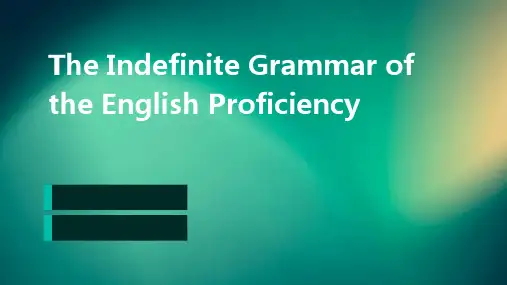
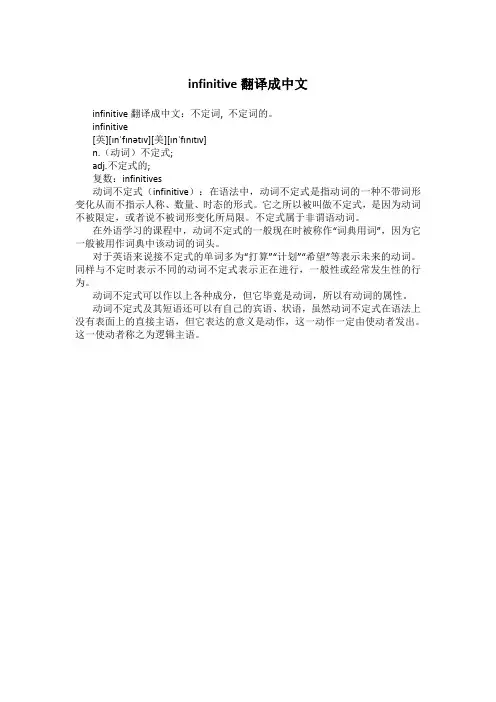
infinitive翻译成中文
infinitive翻译成中文:不定词, 不定词的。
infinitive
[英][ɪnˈfɪnətɪv][美][ɪnˈfɪnɪtɪv]
n.(动词)不定式;
adj.不定式的;
复数:infinitives
动词不定式(infinitive):在语法中,动词不定式是指动词的一种不带词形变化从而不指示人称、数量、时态的形式。
它之所以被叫做不定式,是因为动词不被限定,或者说不被词形变化所局限。
不定式属于非谓语动词。
在外语学习的课程中,动词不定式的一般现在时被称作“词典用词”,因为它一般被用作词典中该动词的词头。
对于英语来说接不定式的单词多为“打算”“计划”“希望”等表示未来的动词。
同样与不定时表示不同的动词不定式表示正在进行,一般性或经常发生性的行为。
动词不定式可以作以上各种成分,但它毕竟是动词,所以有动词的属性。
动词不定式及其短语还可以有自己的宾语、状语,虽然动词不定式在语法上没有表面上的直接主语,但它表达的意义是动作,这一动作一定由使动者发出。
这一使动者称之为逻辑主语。
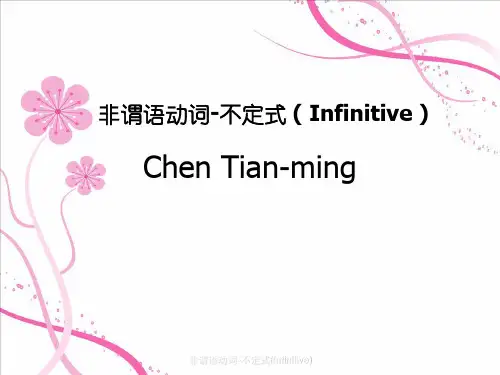
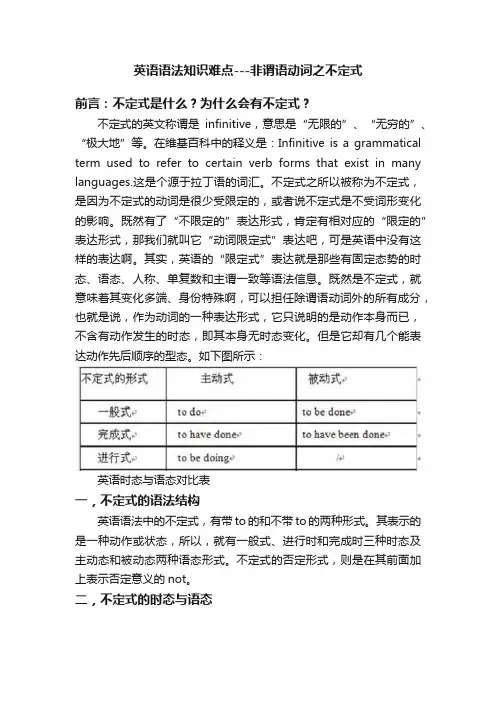
英语语法知识难点---非谓语动词之不定式前言:不定式是什么?为什么会有不定式?不定式的英文称谓是infinitive,意思是“无限的”、“无穷的”、“极大地”等。
在维基百科中的释义是:Infinitive is a grammatical term used to refer to certain verb forms that exist in many languages.这是个源于拉丁语的词汇。
不定式之所以被称为不定式,是因为不定式的动词是很少受限定的,或者说不定式是不受词形变化的影响。
既然有了“不限定的”表达形式,肯定有相对应的“限定的”表达形式,那我们就叫它“动词限定式”表达吧,可是英语中没有这样的表达啊。
其实,英语的“限定式”表达就是那些有固定态势的时态、语态、人称、单复数和主谓一致等语法信息。
既然是不定式,就意味着其变化多端、身份特殊啊,可以担任除谓语动词外的所有成分,也就是说,作为动词的一种表达形式,它只说明的是动作本身而已,不含有动作发生的时态,即其本身无时态变化。
但是它却有几个能表达动作先后顺序的型态。
如下图所示:英语时态与语态对比表一,不定式的语法结构英语语法中的不定式,有带to的和不带to的两种形式。
其表示的是一种动作或状态,所以,就有一般式、进行时和完成时三种时态及主动态和被动态两种语态形式。
不定式的否定形式,则是在其前面加上表示否定意义的not。
二,不定式的时态与语态英语时态与语态对比表不定式的一般式表示的动作与谓语动词的动作无时间上的先后顺序;不定时的完成式表示的动作一般发生在谓语动词前,强调动作的先后顺序;不定式的进行时表示的动作一般与谓语动词同时进行。
例句:I hope to finish reading the noval today. 我希望今天读完这本小说。
You seem to have travelled many times. 你好像旅行过很多次了。
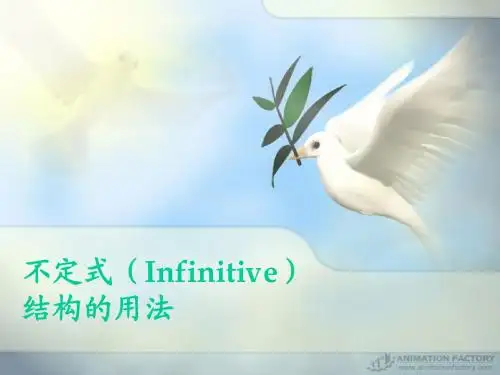
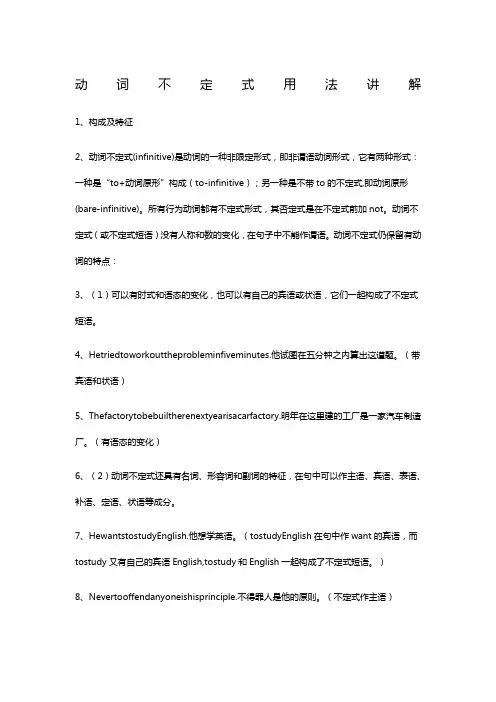
动词不定式用法讲解1、构成及特征2、动词不定式(infinitive)是动词的一种非限定形式,即非谓语动词形式,它有两种形式:一种是“to+动词原形”构成(to-infinitive);另一种是不带to的不定式,即动词原形(bare-infinitive)。
所有行为动词都有不定式形式,其否定式是在不定式前加not。
动词不定式(或不定式短语)没有人称和数的变化,在句子中不能作谓语。
动词不定式仍保留有动词的特点:3、(1)可以有时式和语态的变化,也可以有自己的宾语或状语,它们一起构成了不定式短语。
4、Hetriedtoworkouttheprobleminfiveminutes.他试图在五分钟之内算出这道题。
(带宾语和状语)5、Thefactorytobebuiltherenextyearisacarfactory.明年在这里建的工厂是一家汽车制造厂。
(有语态的变化)6、(2)动词不定式还具有名词、形容词和副词的特征,在句中可以作主语、宾语、表语、补语、定语、状语等成分。
7、HewantstostudyEnglish.他想学英语。
(tostudyEnglish在句中作want的宾语,而tostudy又有自己的宾语English,tostudy和English一起构成了不定式短语。
)8、Nevertooffendanyoneishisprinciple.不得罪人是他的原则。
(不定式作主语)9、注意:不定式在许多场合具有情态意义。
作主语时,相当于一个带有情态动词的主语从句;作宾语时,相当于一个带有情态动词的宾语从句;作定语时,相当于一个带有情态动词的定语从句;作目的状语时,相当于sothat或inorderthat引导的目的状语从句。
10、Itisrightforhertosayso.(=Itisrightthatsheshouldsayso.)她这样说是对的。
11、Hehasalotofworktodo.(=…thatheshoulddo)他有很多工作要做。
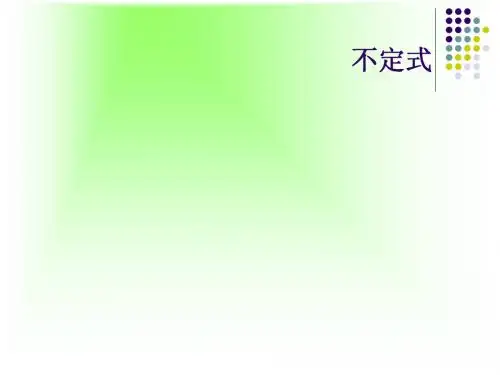
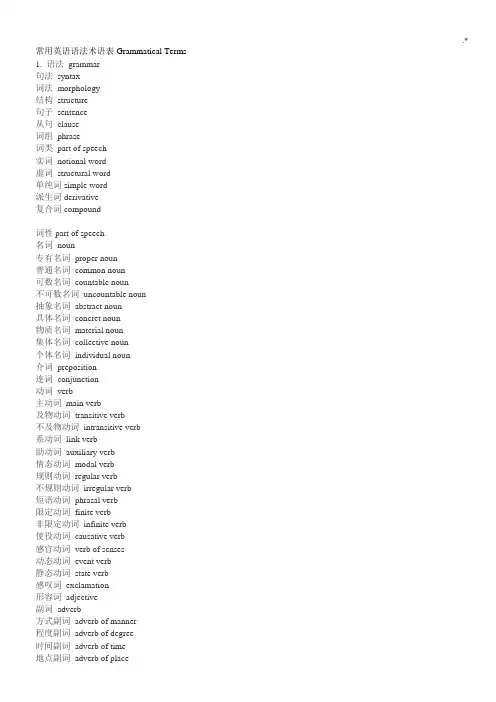
常用英语语法术语表Grammatical Terms 1. 语法grammar句法syntax词法morphology结构structure句子sentence从句clause词组phrase词类part of speech实词notional word虚词structural word单纯词simple word派生词derivative复合词compound词性part of speech名词noun专有名词proper noun普通名词common noun可数名词countable noun不可数名词uncountable noun抽象名词abstract noun具体名词concret noun物质名词material noun集体名词collective noun个体名词individual noun介词preposition连词conjunction动词verb主动词main verb及物动词transitive verb不及物动词intransitive verb系动词link verb助动词auxiliary verb情态动词modal verb规则动词regular verb不规则动词irregular verb短语动词phrasal verb限定动词finite verb非限定动词infinite verb使役动词causative verb感官动词verb of senses动态动词event verb静态动词state verb感叹词exclamation形容词adjective副词adverb方式副词adverb of manner程度副词adverb of degree时间副词adverb of time地点副词adverb of place修饰性副词adjunct连接性副词conjunct疑问副词interogative adverb关系副词relative adverb代词pronoun人称代词personal pronoun物主代词possesive pronoun反身代词reflexive pronoun相互代词reciprocal pronoun指示代词demonstrative pronoun疑问代词interrogative pronoun关系代词relative pronoun不定代词indefinite pronoun物主代词possecive pronoun名词性物主代词nominal possesive prnoun形容词性物主代词adjectival possesive pronoun冠词article定冠词definite article不定冠词indefinite article数词numeral基数词cardinal numeral序数词ordinal numeral分数词fractional numeral形式form单数形式singular form复数形式plural form限定动词finite verb form非限定动词non-finite verb form原形base form2.morphology词法notional实词form word虚词word-building构词法root词根prefix前缀suffix后缀synonym同义词antonym反义词conversion转化法derivation派生法affixation词缀法composition合成法compound复合词parts of speech词类noun名词pronoun代词numeral数词adjective形容词verb动词adverb副词article冠词preposition介词conjunction连词interjection感叹词particle引导词classification of nouns名词的分类common noun普通名词proper noun专有名词collective noun集合名词material noun物质名词abstract noun抽象名词countable noun可数名词personal pronoun人称代词possessive pronoun物主代词reflexive pronoun反身代词demonstrative pronoun指示代词interrogative pronoun疑问代词relative pronoun关系代词indefinite pronoun不定代词reciprocal pronoun相互代词case格nominative case主格objective case宾格possessive case所有格singular form单数形式plural form复数形式cardinal numeral基数词ordinal numeral序数词fraction numeral分数数词degrees of comparison比较级positive degree原级comparative degree比较级superlative degree最高级notional verb实义动词modal verb情态动词link verb连系动词auxiliary verb助动词transitive verb及物动词intransitive verb不及物动词regular verb规则动词irregular verb不规则动词finite verb限定动词non-finite verb非限定动词person人称number数gender性tense时态voice语态mood语气principal forms of verbs动词的主要形式present form现在形式past form过去形式participle分词present participle现在分词past participle过去分词infinitive不定式gerund动名词verbal noun动名词simple present tense一般现在时simple past tense一般过去时simple future tense一般将来时present continuous tense现在进行时past continuous tense过去进行时future continuous tense将来进行时past perfect tense过去完成时future perfect tense将来完成时present perfect continuous tense现在完成进行时future perfect continuous tense将来完成进行时sequence of tenses时态的呼应passive voice被动语态active voice主动语态indicative mood陈述语气imperative mood祈使语气subjunctive mood虚拟语气adverb of time 时间副词adverb of place地点副词adverb of manner方式副词adverb of degree程度副词adverb of frequency频度副词conjunctive adverb连接副词definite article定冠词indefinite article不定冠词coordinating conjunction并列连词subordinating conjunction从属连词syntax句法declarative sentence陈述句imperative sentence祈使句exclamatory sentence感叹句interrogative sentence疑问句general question一般疑问句special question特殊疑问句alternative question选择疑问句disjunctive question反意疑问句simple sentence简单句compound sentence并列句语法术语Grammar Terms 语法grammar句法syntax词法morphology结构structure句子sentence从句clause词组phrase词类part of speech实词notional word虚词structural word名词noun专有名词proper noun普通名词common noun可数名词countable noun不可数名词uncountable noun抽象名词abstract noun具体名词concrete noun物质名词material noun集体名词collective noun个体名词individual noun介词preposition连词conjunction动词verb主动词main verb及物动词transitive verb不及物动词intransitive verb系动词link verb助动词auxiliary verb情态动词modal verb规则动词regular verb不规则动词irregular verb短语动词phrasal verb限定动词finite verb非限定动词infinite verb使役动词causative verb感官动词verb of senses动态动词event verb静态动词state verb感叹词exclamation形容词adjective副词adverb方式副词adverb of manner程度副词adverb of degree时间副词adverb of time地点副词adverb of place修饰性副词adjunct连接性副词conjunct疑问副词interrogative adverb关系副词relative adverb代词pronoun人称代词personal pronoun物主代词possessive pronoun反身代词reflexive pronoun相互代词reciprocal pronoun指示代词demonstrative pronoun疑问代词interrogative pronoun关系代词relative pronoun不定代词indefinite pronoun名词性物主代词nominal possessive pronoun形容词性物主代词adjectival possessive pronoun冠词article定冠词definite article不定冠词indefinite article数词numeral基数词cardinal numeral序数词ordinal numeral分数词fractional numeral形式form单数形式singular form复数形式plural form限定动词finite verb form非限定动词non-finite verb form原形base form从句clause从属句subordinate clause并列句coordinate clause名词从句nominal clause定语从句attributive clause状语从句adverbial clause宾语从句object clause主语从句subject clause同位语从句appositive clause时间状语从句adverbial clause of time地点状语从句adverbial clause of place方式状语从句adverbial clause of manner让步状语从句adverbial clause of concession原因状语从句adverbial clause of cause结果状语从句adverbial clause of result目的状语从句adverbial clause of purpose条件状语从句adverbial clause of condition真实条件状语从句adverbial clause of real condition非真实条件状语从句adverbial clause of unreal condition 含蓄条件句adverbial clause of implied condition错综条件句adverbial clause of mixed condition句子sentence简单句simple sentence并列句compound sentence复合句complex sentence并列复合句compound complex sentence陈述句declarative sentence疑问句interrogative sentence一般疑问句general question特殊疑问句special question选择疑问句alternative question附加疑问句tag question反义疑问句disjunctive question修辞疑问句rhetorical question感叹疑问句exclamatory question存在句existential sentence肯定句positive sentence否定句negative sentence祈使句imperative sentence省略句elliptical sentence感叹句exclamatory sentence基本句型basic sentence pattern句子成分members of sentences主语subject谓语predicate宾语object双宾语dual object直接宾语direct object间接宾语indirect object复合宾语complex object同源宾语cognate object补语complement主补subject complement宾补object complement表语predicative定语attribute同位语appositive状语adverbial句法关系syntactic relationship并列coordinate从属subordination修饰modification前置修饰pre-modification后置修饰post-modification限制restriction双重限制double-restriction非限制non-restriction数number单数形式singular form复数形式plural form规则形式regular form不规则形式irregular form格case普通格common case所有格possessive case主格nominative case宾格objective case性gender阳性masculine阴性feminine通性common中性neuter人称person第一人称first person第二人称second person第三人称third person时态tense过去将来时past future tense过去将来进行时past future continuous tense过去将来完成时past future perfect tense一般现在时present simple tense一般过去时past simple tense一般将来时future simple tense现在完成时past perfect tense过去完成时present perfect tense将来完成时future perfect tense现在进行时present continuous tense过去进行时past continuous tense将来进行时future continuous tense过去将来进行时past future continuous tense现在完成进行时present perfect continuous tense 过去完成进行时past perfect continuous tense语态voice主动语态active voice被动语态passive voice语气mood陈述语气indicative mood祈使语气imperative mood虚拟语气subjunctive mood否定negation否定范围scope of negation全部否定full negation局部否定partial negation转移否定shift of negation语序order自然语序natural order倒装语序inversion全部倒装full inversion部分倒装partial inversion直接引语direct speech间接引语indirect speech自由直接引语free direct speech自由间接引语free indirect speech一致agreement主谓一致subject-predicate agreement 语法一致grammatical agreement概念一致notional agreement就近原则principle of proximity强调emphasis重复repetition语音pronunciation语调tone升调rising tone降调falling tone降升调falling-rising tone文体style正式文体formal非正式文体informal口语spoken/oral English感情色彩emotional coloring褒义commendatory贬义derogatory幽默humorous讽刺sarcastic挖苦ironic。
e k t 词性:V e r b成分(S a t z t e i l):S u b j.Substantiv Pr?dikat (Satzaussage)Adjektiv ObjektArtikel AttributPronomen AdverbialeAdverb Richtungserg?nzungPr?positionKonjunktionNumerale: Grundzahl OrdnungszahlInterjektion时态:Pr?sens 格:Nominativ Genitiv Dativ Akkusativ Perfekt 变格:DeklinationPr?teritum 动词变位:KonjugationFutur 不定式:Infinitiv mit & ohne ?zu“Plusquamperfekt 分词:Partizip 1 Partizip 2德语的语态:Aktiv Passiv动词的叙述方式(语式):直陈式:Indikativ 虚拟式:Konjunktiv 1; Konjunktiv 2 命令式:Imperativ 主句:Hauptsatz 从句:Nebensatz;Unterordnung单数和复数:Singular Plural复合词:Kompositum zusammengesetztes Wort从句:ObjektsatzRelativsatz (Relativadverb Relativpronomen)Adverbialsatz: Konditionalsatz Temporalsatz Kausalsatz Folgesatz Konzessivsatz ModalsatzAbsichtssatz第一部分:词法Erster Teil: WortlehreI.德语的词类Die WortartenII.冠词Der ArtikelA.冠词的变化Die Deklination des Artikels1.定冠词的变化Die Deklination des bestimmten Artikels2.不定冠词的变化Die Deklination des unbestimmten ArtikelsB.冠词的用法Der Gebrauch des Artikels1.定冠词的用法Der Gebrauch des bestimmten Artikels2.不定冠词的用法Der Gebrauch des unbestimmten ArtikelsIII.名词Das SubstantivA.名词的种类Die Arten der SubstantiveB.名词的性Das Genus der SubstantiveC.名词的数Der Numerus der SubstantiveD.名词复数的构成Die Pluralbildung der SubstantiveE.名词的格Der Kasus der SubstantiveF.名词的变化Die Deklination der SubstantiveG.外来语名词的变化Die Deklination der Fremdw?rterH.专有名词的变化Die Deklination der EigennamenIV.形容词Das AdjektivA.形容词的意义Die Bedeutung des AdjektivsB.形容词在句中的职能Die Funktion des Adjektivs im SatzeC.形容词的支配Die Rektion des AdjektivsD.形容词的变化Die Deklination des AdjektivsE.形容词的比较等级Die Komparation des AdjektivsF.关于形容词的大小写Zur Gro?- und Kleinschreibung des AdjektivsV.数词Das NumeraleA.数词的种类Die Arten des Numerales1.定数词Das bestimmte Numeralea.基数词Die Kardinalzahlen oder Grundzahlenb.序数词Die Ordinalzahlen oder Ordnungszahlen2.不定数词Das unbestimmte Numeralea.重复数词Wiederholungszahlenb.种类数词Gattungszahlenc.倍数词Vervielf?ltigungszahlend.分配数词Einteilungszahlene.分数词Bruchzahlenf.划分数词VerteilungszahlenB.数词的性质Das Wesen des NumeralesC.数词的变化Die Deklination des NumeralesVI.代词Das PronomenA.人称代词Das PersonalpronomenB.反身代词Das ReflexivpronomenC.物主代词Das PossessivpronomenD.指示代词Das DemonstrativpronomenE.关系代词Das RelativpronomenF.疑问代词Das InterrogativpronomenG.不定代词Das IndefinitpronomenVII.动词Das VerbA.独立动词和助动词Vollverben und Hilfsverben1.独立动词Vollverben2.助动词Hilfsverbena.时间助动词Temporale Hilfsverbenb.情态助动词Modale HilfsverbenB.及物动词和不及物动词Transitive und intransitive VerbenC.反身宾语动词Reflexive VerbenD.无人称动词Unpers?nliche VerbenE.强变化和弱变化动词Starke und schwache Verben1.强变化动词Starke Verben2.弱变化动词Schwache Verben3.徘徊于强弱变化之间的动词Verben, die zwischen starker und schwacher Flexion schwanken4.不规则变化的动词Unregelm??ige VerbenF.动词的变化Die Konjugation des Verbs1.动词的不定形式Die infinite Verbforma.不定式Der Infinitiv1)不定式的构成和形式Bildung und Form des Infinitivs2)不定式的用法Gebrauch des Infinitivsb.分词Das Partizip1)分词的构成和形式Bildung und Form des Partizipsa)现在分词(第一分词)Pr?senspartizip (Partizip I)b)过去分词(第二分词)Perfektpartizip (Partizip II)2)分词的意义和用法Bedeutung und Gebrauch des Partizipsa)现在分词b)过去分词2.动词的人称形式动词变化表1-5G.动词时态的用法Der Gebrauch der Tempora (Tempus的Pl.)1.现在时Pr?sens2.过去时Imperfekt Pr?teritum3.现在完成时Perfekt4.过去完成时Plusquamperfekt5.第一将来时Futur I6.第二将来时Futur IIH.动词的行动方式:主动态和被动态Die Verhaltensrichtung des Verbs: Aktiv und PassivI.时间助动词haben与sein的用法Gebrauch der temporalen Hilfsverben haben und sein1.时间助动词haben/Hilfsverbhaben2.时间助动词sein/HilfsverbseinJ.时间助动词werden的用法Gebrauch des temporalen HilfsverbswerdenK.动词的叙述方式Der Modus des Verbs1.直陈式Der Indikativ2.虚拟式Der Konjunktiva.虚拟式的用法Gebrauch des Konjunktivsb.虚拟式的时态Zeitformen des Konjunktivsc.虚拟式的构成Bildung des Konjunktivsd.条件式Konditional3.命令式Der ImperativVIII.副词Das AdverbA.副词的构成Bildung der AdverbienB.副词的意义Bedeutung der Adverbien1.地方副词Adverbien des Raumes(=des Ortes)2.时间副词Adverbien der Zeit3.情况副词Adverbien der Art und Weise4.原因副词Adverbien des GrundesC.副词的比较等级Steigerung (Komparation) der AdverbienD.副词的支配Rektion der AdverbienIX.介词Die Pr?positionA.介词的意义Bedeutung der Pr?positionB.介词的支配Rektion der Pr?position1.支配第二格的介词Pr?positionen, die den Genitiv regieren2.支配第三格的介词Pr?positionen, die den Dativ regieren3.支配第四格的介词Pr?positionen, die den Akkusativ regieren4.支配第三格和第四格的介词Pr?positionen, die den Dativ und Akkusativ regierenC.介词的用法Anwendung der Pr?positionD.在修辞学方面关于介词的用法必须注意的地方Stilistische Bemerkung zur Anwendung der Pr?position X.连接词Die KonjunktionA.连接词的性质和职能Wesen und Aufgabe der KonjunktionB.连接词的意义Bedeutung der Konjunktion1.并列连接词nebenordnende oder koordinierende Konjunktionen2.从属连接词Unterordnende oder subordinierende Konjunktionen主要连接词一览表Tabelle der wichtigsten KonjunktionenXI.感叹词Die Interjektion第二部分:句法Zweiter Teil: SatzlehreI.句子的性质Das Wesen des SatzesII.句子的种类Die Arten der S?tzeIII.简单句Der einfache SatzA.纯粹的简单句Der reine einfache SatzB扩展的简单句Der erweiterte einfache SatzIV.句子的成分SatzgliederA.主语Das SubjektB.谓语Das Pr?dikat1.谓语的性质Wesen des Pr?dikats2.谓语的种类Arten des Pr?dikats3.谓语与主语的一致关系Die übereinstimmung des Pr?dikats mit dem Subjekt4.谓语和主语的语序Die Wortstellung des Pr?dikats zum SubjektC.宾语Das Objekt1.第四格宾语Akkusativobjekt2.第三格宾语Dativobjekt3.第二格宾语Genitivobjekt4.介词宾语Pr?positionalobjekt5.支配两个宾语的动词Verben, die zwei Objekte regieren6.宾语在句中的语序Die Wortstellung (Wortfolge) des Objekts im SatzD.状语Die Adverbialbestimmung1.地方状语Adverbialbestimmung des Ortes2.时间状语Adverbialbestimmung der Zeit3.情况状语Adverbialbestimmung der Art und Weise4.原因状语Adverbialbestimmung des GrundesE.定语Das Attribut1.形容词定语Adjektivattribut2.名词定语Substantivattribut3.不定式加zu作定语Infinitiv mit zu als Attribut4.分词短语作定语Partizipialgruppe als Attribut5.定语从句Der Attributsatz (Relativsatz)F.同位语Die AppositionV.复合句Der zusammengesetzte SatzA.并列复合句DieSatzverbindung1.无连接成分的并列复合句Asyndetische Satzverbindung2.有连接成分的并列复合句Syndetische Satzverbindunga.联合的并列复合句Kopulative Satzverbindungb.对立的并列复合句Adversative Satzverbindungc.原因或结果的并列复合句Kausale oder Konsekutive SatzverbindungB.主从复合句Das Satzgefüge1.从句的性质Wesen der Nebens?tze2.从句的特征Merkmale der Nebens?tze8.从句的分类Einteilung der Nebens?tzea.根据它们对主句的从属程度nach den Grad ihrer Abh?ngigkeit vom Hauptsatzb.根据它们在主从复合句中的位置nach ihrer Stellung im Satzgefügec.根据它们与上一级句子联系的方式nach der Art ihrer Verbindung mit dem übergeordneten Satz1)连接词从句Konjunktionalsatz2)关系从句Relativsatz3)间接问句Der indirekte Fragesatz4)伪装从句Der verkappte Nebensatzd.根据它们的句法作用nach ihrer Aufgabe (Funktion)1)主语从句Subjektsatz2)表语从句Pr?dikativsatz (Satz des Pr?dikatsnomens)3)宾语从句Objektsatz4)定语从句Attributsatz5)状语从句Adverbialsatza)地方状语从句Adverbialsatz des Ortes (Lokalsatz)b)时间状语从句Adverbialsatz der Zeit (Temporalsatz)c)情况状语从句Adverbialsatz der Art und Weise (Modalsatz)d)原因状语从句Adverbialsatz des Grundes (Kausalsatz)(1)原因从句Begründungssatz (Kausalsatz)(2)目的从句Absichtssatz (Finalsatz)(3)条件从句Bedingungssatz (Konditionalsatz)(4)让步从句Einr?umungssatz (Konzessivsatz)4.不定式句.分词句和句同位语Der Infinitivsatz, der Partizipialsatz und die Satzappositiona.不定式句(不定式短语)Der Infinitivsatz (Die Infinitivgruppe)1)目的从句Absichtssatz: um...zu2)情况状语从句Adverbialsatz der Art und Weise: ohne...zu...,anstatt(=statt)zu3)赤裸的不定式句Nackter Infinitivsatzb.分词句(分词短语)Der Partizipialsatz (die Partizipialgruppe)c.句同位语Satzapposition语法名称索引Index der grammatischen Bezeichnungen语词索引Wortregister。
在句子中充当除谓语以外的各种句子成分的动词形式叫做非谓语动词(the Non-Finite Verbs)。
非谓语动词有三种:不定式(the Infinites)、动名词(the Gerunds)和分词(the Participles)。
动词不定式的时态、语态动词不定式可以作以上各种成分,但它毕竟是动词,所以有动词的属性动词不定式及其短语还可以有自己的宾语、状语,虽然动词不定式在语法上没有表面上的直接主语,但它表达的意义是动作,这一动作一定由使动者发出。
这一使动者我们称之为逻辑主语,其形式如下:主动形式被动形式一般式(not)to make (not)to be made完成式(not)to have made (not)to have been made进行式(not)to be making完成进行式(not)to have been making(1)语态如果动词不定式的逻辑主语是这个不定式所表示的动作的承受者,不定式一般要用被动语态形式。
如:It's a great honour to be invited to Mary's birthday party.(不定式作主语)It was impossible for lost time to be made up.(不定式作主语)I wish to be sent to work in the country.(不定式作宾语)Can you tell me which is the car to be repaired?(不定式作定语)He went to the hospital to be examined.(不定式作状语)在There be结构中,修饰主语的不定式可用被动,也可用主动。
如:There are still many things to take care of (to be taken care of).但有时两种形式表达的意思不同,如:These is nothing to do now.( We have nothing to do now.) There is nothing to be done now.(We can donothing now.)(2)时态1) 现在时:一般现在时表示的动词,有时与谓语动词表示的动作同时发生,有时发生在谓语动词的动作之后。
[转]不定式(Infinitiv...不定式(Infinitive) 过去式(Past Tense) 过去分词(Past Participle)最佳答案不定式(Infinitive) 过去式(Past Tense) 过去分词(Past Participle)abide 居住 abode, abided abode, abidedalight 下车 alighted, alit alighted, alitawake 唤醒 awoke awoke, awakedbe 是 was, were beenbear 忍受 bore borne, bornbeat 击打 beat beatenbecome 变成 became becomebefall 发⽣ befell befallenbeget 引起 begot begotten, begotbegin 开始 began begunbehold 注意看 beheld beheldbend 鞠躬 bent bentbereave 剥夺 bereaved, bereft bereaved, bereftbeseech 乞求 besought, beseeched besought, beseechedbeset 围攻 beset besetbespeak 预约 bespoke bespoken, bespokebespread 铺盖 bespread bespreadbestrew 散放 bestrewed bestrewed, bestrewnbestride 跨坐 bestrode bestridden, bestrid, bestrodebet 打赌 bet, betted bet, bettedbetake 前往 betook betakenbethink 想起 bethought bethoughtbid 出价 bade, bid bidden, bidbide 忍受 bode, bided bidedbind 绑 bound boundbite 咬 bit bitten, bitbleed 流⾎ bled bledblend 混合 blended, blent blended, blentbless 祝福 blessed, blest blessed, blestblow 吹 blew blownbreak 断开 broke brokenbreed 产⽣ bred bredbring 带来 brought broughtbroadcast ⼴播 broadcast, broadcasted broadcast, broadcastedbrowbeat 严斥 browbeat browbeatenbuild 建筑 built builtburn 燃烧 burnt, burned burnt, burnedburst 爆炸 burst burstbuy 买 bought boughtcan 能 could -cast 铸造 cast castcatch 抓住 caught caughtchide 责骂 chid, chided chid, chidden, chidedchoose 选择 chose chosencleave:分裂 cleaved, cleft, clove cleaved, cleft打通 clave clovencling 粘附 clung clungclothe 穿⾐ clothed, clad clothed, cladcome 来 came comecost 价值 cost costcreep 爬⾏ crept creptcrow 报晓 crowed, crew crowedcut 切 cut cutdare 敢 dared, durst dareddeal 处理 dealt dealtdig 挖洞 dug dugdispread 扩散 dispread dispreaddo 做 did donedraw 画 drew drawndream 做梦 dreamed, dreamt dreamed, dreamtdrink 喝 drank drunkdrive 驾车 drove drivendwell 细想 dwelt, dwelled dwelt, dwelledeat 吃 ate eatenfall 落下 fell fallenfeed 喂 fed fedfeel 感觉 felt feltfight 打架 fought foughtfind 找寻 found foundflee 逃跑 fled fledfling 派出 flung flungfly:飞 flew flown逃逸 fled fled击飞 flied fliedforbear 克制 forbore forborneforbid 禁⽌ forbade, forbad forbiddenforecast 预报 forecast, forecasted forecast, forecastedfordo 损毁 fordid fordoneforego 居先 forewent foregoneforeknow 预知 foreknew foreknownforerun 作先驱 foreran forerunforesee 看穿 foresaw foreseenforeshow 预⽰ foreshowed foreshownforetell 预⾔ foretold foretoldforget 忘记 forgot forgotten, forgotforgive 原谅 forgave forgivenforsake 抛弃 forsook forsakenforswear 发假誓 forswore forswornfreeze 冷冻 froze frozengainsay 反驳 gainsaid gainsaidget 得到 got got, gottengild 镀⾦ gilded, gilt gildedgird 束缚 girded, girt girded, girtgive 给予 gave givengo 去 went gonegrave 铭记 graved graven, gravedgrind 磨 ground groundgrow 成长 grew grownhamstring 残废 hamstringed, hamstrung hamstringed, hamstrung hang:挂 hung hung吊死 hanged hangedhave 有 had hadhear 听 heard heardheave ⼒擎 heaved, hove heaved, hovehew 砍劈 hewed hewed, hewnhide 隐藏 hid hidden, hidhit 打 hit hithold 拿住 held heldhurt 伤害 hurt hurtinlay 镶嵌 inlaid inlaidkeep 保持 kept keptkneel 下跪 knelt, kneeled knelt, kneeledknit 编结 knitted, knit knitted, knitknow 知道 knew knownlade 舀⽔ laded laded, ladenlay 放置 laid laidlead 带领 led ledlean 倾斜 leaned, leant leaned, leantleap 跳跃 leapt, leaped leapt, leapedlearn 学习 learnt, learned learnt, learnedleave 离开 left leftlend 借出 lent lentlet 让 let letlie:躺下 lay lain撒谎 lied liedlight:点燃 lit lit照亮 lighted lightedlose 丢失 lost lostmake 做 made mademay 可以 might -mean 意思 meant meantmeet 见⾯ met metmelt 熔化 melted melted, meltenmisdeal 处理不当 misdealt misdealtmisgive 担忧 misgave misgivenmislay 放错 mislaid mislaidmislead 欺骗 misled misledmistake 弄错 mistook mistaken misunderstand 误会 misunderstood misunderstood mow 割草 mowed mowed, mownmust 必须 must -ought 应该 ought -outbid 中标 outbade, outbid outbidden, outbid outbreed 超产 outbred outbredoutdo 胜过 outdid outdoneouteat 多吃 outate outeatenoutfight 击败 outfought outfoughtoutgo ⽀出 outwent outgoneoutgrow ⽣长快 outgrew outgrownoutlay 花费 outlaid outlaidoutride 冲过 outrode outriddenoutrun 超越 outran outrunoutsell 畅销 outsold outsoldoutshine 亮过 outshone outshoneoutshoot 发射 outshot outshotoutsit 久坐 outsat outsatoutspend 花钱过多 outspent outspent outspread 伸展 outspread outspreadoutthrow 扔出 outthrew outthrownoutthrust 刺穿 outthrust outthrustoutwear ⽤旧 outwore outwornoverbear 压抑 overbore overborneoverbid 漫天要价 overbid overbidden, overbid overblow 吹过 overblew overblownoverbuild 建造过多 overbuilt overbuiltoverbuy 买得过贵 overbought overbought overcast 遮蔽 overcast overcastovercome 克服 overcame overcomeoverdo 做得过分 overdid overdoneoverdraw 透⽀ overdrew overdrawnoverdrive 超速 overdrove overdrivenovereat 吃得太多 overate overeatenoverfeed 喂得太多 overfed overfedoverfly 飞过 overflew overflownovergrow 过度⽣长 overgrew overgrownoverhang 悬垂 overhung overhungoverhear ⽆意听到 overheard overheardoverlade 超载 overladed overladed, overladenoverlay 覆盖 overlaid overlaidoverleap 跳过 overleapt, overleaped overleapt, overleaped overlie 躺在上⾯ overlay overlainoverpay 付出太多 overpaid overpaidoverride 藐视 overrode overriddenoverrun 泛滥 overran overrunoversee 监督 oversaw overseenoversell 卖完 oversold oversoldoverset 推翻 overset oversetoversew 缝合 oversewed oversewed, oversewn overshoot 打过头 overshot overshotoversleep 睡过头 overslept oversleptoverspend 过度使⽤ overspent overspentoverspread 扩张 overspread overspreadovertake 追上 overtook overtakenoverthrow 推倒 overthrew overthrownoverwind 旋太紧 overwound overwoundoverwrite 写得冗长 overwrote overwrittenpartake 参与 partook partakenpay 付出 paid paidprecast 预计 precast precastprechoose 预选 prechose prechosenprove 证明 proved proved, provenput 放 put putquit 退出 quitted, quit quitted, quitread 读 read readreave 掠夺 reaved, reft reaved, reftrebuild 重建 rebuilt rebuiltrecast 重铸 recast recastreeve 贯穿 rove, reeved rove, reevedrelay 转送 relaid relaidrend 撕破 rent rentrepay 报答 repaid repaidreset 重设定 reset resetretell 重述 retold retoldrid 除去 rid, ridded rid, riddedride 骑 rode riddenring 响 rang rungrise 升起 rose risenrive 扯裂 riven riven, rivedrun 跑 ran runsaw 锯 sawed sawn, sawedsay 说 said saidsee 看见 saw seenseek 搜索 sought soughtsell 卖 sold soldsend 送 sent sentset 设置 set setsew 缝补 sewed sewn, sewedshake 摇晃 shook shakenshall 将 should -shave 剃须 shaved shaved, shavenshear 修剪 sheared shorn, shearedshed 脱落 shed shedshine 照耀 shone, shined shone, shinedshoe 穿鞋 shod, shoed shod, shoedshoot 射击 shot shotshow 展⽰ showed shown, showedshred 撕碎 shredded, shred shredded, shredshrink 萎缩 shrank, shrunk shrunk, shrunken shrive 忏悔 shrove, shrived shriven, shrived shut 关闭 shut shutsing 唱歌 sang, sung sungsink 下沉 sank, sunk sunk, sunkensit 坐 sat satslay 残杀 slew slainsleep 睡觉 slept sleptslide 滑动 slid slid, sliddensling 吊起 slung slungslink 潜逃 slunk slunkslit 切开 slit slitsmell 闻 smelt, smelled smelt, smelledsmite 打击 smote smitten, smotesow 播种 sowed sown, sowedspeak 讲话 spoke spokenspeed 促进 sped, speeded sped, speededspell 拼写 spelt, spelled spelt, spelledspend 花钱 spent spentspill 溢出 spilt, spilled spilt, spilledspin 旋转 spun spunspit 吐 spat, spit spat, spitsplit 劈开 split splitspoil 破坏 spoilt, spoiled spoilt, spoiledspread 散布 spread spreadspring 弹跳 sprang, sprung sprungstand 站⽴ stood stoodstave 凿孔 staved, stove staved, stovesteal 偷窃 stole stolenstick 粘贴 stuck stucksting 刺激 stung stungstink 发臭 stank, stunk stunkstrew 散播 strewed strewn, strewedstride ⼤踏步 strode stridden, stridstrike 打动 struck struck, strickenstring 捆扎 strung strungstrive 奋⽃ strove, strived striven, strivedswear 发誓 swore swornsweat 出汗 sweat, sweated sweat, sweated sweep 打扫 swept sweptswell 膨胀 swelled swollen, swelledswim 游泳 swam swumswing 摆动 swung swungtake 拿到 took takenteach 教 taught taughttear 撕 tore torntell 讲述 told toldthink 思考 tought thoughtthrive 蔓延 throve, thrived thriven, thrivedthrow 投掷 threw thrownthrust 刺⼊ thrust thrusttread 践踏 trod trodden, trodunbend 放松 unbent unbentunbind 解开 unbound unboundunbuild 拆除 unbuilt unbuiltunderbid 出低价 underbid underbidden, underbid underbuy 贱价买⾛ underbought underbought undercut 廉价出售 undercut undercutunderdo 不尽⼒ underdid underdone underfeed 喂不饱 underfed underfedundergo 遭受 underwent undergoneunderlay 铺垫 underlaid underlaidunderlet 低价出租 underlet underletunderlie 位居其次 underlay underlainunderpay 克扣 underpaid underpaidunderrun 跑不过 underran underrunundersell 抛售 undersold undersoldunderset 暗流 underset undersetundershoot 进⼊射程 undershot undershot understand 理解 understood understood undertake 担任 undertook undertakenunderwrite 签名 underwrote underwrittenundo 取消 undid undoneundraw 拉开 undrew undrawnunfreeze 解冻 unfroze unfrozenungird 解带 ungirded, ungirt ungirded, ungirt unhang 解除悬挂 unhung unhungunknit 拆开 unknitted, unknit unknitted, unknit unlade 卸载 unladed unladed, unladenunlay 松开 unlaid unlaidunlearn 忘却 unlearnt, unlearned unlearnt, unlearned unmake 恢复原状 unmade unmadeunreeve 抽出 unrove, unreeved unrove, unreeved unsay 撤销 unsaid unsaidunset 去除设定 unset unsetunsling 取去悬索 unslung unslungunspeak 缄默 unspoke unspokenunstick 扯开 unstuck unstuckunstring 去掉绑扎 unstrung unstrungunswear 毁弃誓⾔ unswore unswornunteach 使⼈忘却 untaught untaughtunthink 打消念头 unthought unthoughtuntread 折回 untrod untrodden, untrodunweave 拆解 unwove unwovenunwind 打开 unwound unwoundupbuild 在上⾯建 upbuilt upbuiltupcast 上抛 upcast upcastuphold 赞成 upheld uphelduppercut 上击 uppercut uppercutuprise 起义 uprose uprisenupset 颠覆 upset upsetupsweep 向上弯曲 upswept upsweptupswing 跃进 upswung upswungwake 醒来 waked, woke waked, woken, woke waylay 埋伏 waylaid waylaidwear 穿着 wore wornweave 编织 wove wovenwed 结婚 wedded, wed wedded, wedweep 哭泣 wept weptwet 打湿 wetted, wet wetted, wetwill 意愿 would -win 获胜 won wonwind 缠绕 winded, wound winded, woundwit 辩智 wist wistwithdraw 撤退 withdrew withdrawnwithhold 扣留 withheld withheldwithstand 对抗 withstood withstoodwork:⼯作 worked worked劳动 wrought wroughtwring 拧 wrung wrungwrite 写 wrote written ethought不规则动词过去式和过去分词归纳不规则动词过去式和过去分词 (2006年最新创作,极品珍藏,初三 ) A. 原形与过去式和过去分词完全相同.cost----cost----costcut----cut----cutput----put----putlet----let----letset----set----sethit----hit----hitshut----shut----shuthurt---hurt----hurtread---read----read 读⾳ /e/lie---lied---lied 说谎lay---laid---laid 放置,下蛋lay--- lain 躺下,位于,平放B. 过去式与过去分词完全相同1. 过去式和过去分词中含有ought, aught, 读⾳是〔 :t〕bright----brought----broughtthink----thought----thoughtbuy----bought----boughtcatch----caught----caughtteach ---- taught ----taught2. 动词原形中的e为o,变成过去式和过去分词。
文末fin正确写法在文末写上FIN的意思是表示已经结束!就是说已经完了,没有下文了fin = end(末尾), limit(界限)来源拉丁名词的finis 意为end,limit。
同义词根有来自拉丁语的termin,ultim 和来自希腊语的bys。
注意有的词根书籍上会把词根fin 发成二个意来单独列出来,如蒋争的《英语词汇的奥秘》就把fin的end 和limit分开,这里我们把这二个意思放在一起,例句也放在一起了。
(*拉丁文finire(=to end),finis(=end,bound)。
——英文根字典)1.affinity(末端在近处 af<ad(=to,near) + fin(=end))n.亲密关系;相似;(异性间的)亲密感,吸引力;喜好,迷恋;[化]亲合性I feel a greater affinity for dogs than for cats. 相比猫,我更喜欢狗。
2.definitive(完全见尾 de(=intensive) + fin(=end))adj.最终的;决定性的;限定性的n.[语]限定词The appeals court offered the definitive ruling in the case. 上诉法庭对那一事件作出了最终判决。
3.infinite(没有结尾in(=not) + fin(=end))adj.无穷的,无限的,无数的;极大的n.(the ~)上帝infinitely adv.无限地,无穷地infinitesimal adj. [数]无穷小的;极小的(-esimal 表示小的形容词后缀)Some mystics who experience God say they feel infinite love and peace. 一些感受到过上帝的神秘主义者说他们体会到无穷的爱和安宁。
4.confinev.限制,限定;禁闭,监禁 n.(pl.)范围,界限,边界*con<com(=together)conlined adj.受限制的;狭窄的beyond the confines of human knowledge 超出人类的知识范围within the confines of this valley 在这个山谷的范围之内5.confinementn.限制,局限;幽禁,监禁;分娩 *con<com(=together)be placed in confinement 被监禁six months solitary confinement 六个月的单独监禁6.definev.给...下定义;阐明 *de(=down)definable adj.可定义的7.definiteadj.清楚的;明确的 *de(=down)definitely adv.明确地,确切地;(用于回答)肯定地,无疑地definite time and place 明确的时间和地点definite article 定冠词8.definitionn.定义;限定;(轮廓的)清晰;(镜头的)分辨率 *de(=down)9.infinitiven.[语]不定式 adj.[语]不定式的 *in(=not)10.infinituden.无限,无穷 *in(=not)infinitude of small particles 无数小微粒11.infinityn.无限,无穷 *in(=not)12.refinev.精制;精炼;使文雅;推敲 *re(=again)13.refinedadj.精炼的;文雅的;精制的 *re(=again)refined manners/language 文雅的态度/言语14.refinementn.精炼,精制;文雅;精巧,精细 *re(=again)a lady of refinement 文雅的女子15.refinern.精制者,精炼者;精制机,精炼机 *re(=again) sugar refiners 制糖厂厂主16.refineryn.精炼厂 *re(=again),ery(=place where)sugar refinery 制糖厂oil refinery 炼油厂17.indefiniteadj.含糊的,模糊的;不明确的 *in(=not),de(=down) indefinite answer 含糊的回答18.indefinableadj.不确定的,难以说明的 *in(=not),de(=down) 19.finaladj.最后的,最终的n.(pl.)决赛;期末考试;(当天报纸的)末版finalist n.决赛参赛选手finally adv.最后,最终tennis finals 网球塞take his finals 参加期末考试20.finalen.结尾;(戏剧的)终场;(交响乐等的)末乐章,终曲21.finalityn.结局;决定性speak with an ari of finality 断言22.finalizev.完成;结束23.financen.财政(学);(pl.)(政府或公司的)财源v.(为计划等)筹措、供给资金24.financialadj.财政的;财务的;金融上的financial condition 财政状况financial crisis 金融危机financial difficulties 财政困难financial resources 财源25.financiern.财政家;金融家26.finen.,v. 罚款(结束的东西,加以解决的东西)27.fineadj.良好的;卓越的;精巧的 v.使精良;精美(被完成)。
非谓语动词一、概念非谓语动词指不能单独做谓语,但同时仍保留动词的某些特征的动词形式。
非谓语动词主要有不定式、动词的-ing形式、动词的-ed形式三类。
它们没有人称和数的变化,但可以有自己的宾语、状语等。
二、真正领悟非谓语动词的用法要具备以下基础知识:1.具有句子结构的知识,要分得清简单句与复合句,陈述句与祈使句。
2.具有简单句最基本的五种句型的知识,要分得清双宾语和复合宾语。
3.具有扎实而丰富的动词知识,要分得清及物动词和不及物动词,双宾动词和复宾动词。
一些最基础最常用的动词的用法应当烂熟于胸。
4.具备各种复合句的知识,能够拆析30词左右长度的复合长、难句。
三、解题思路:1.、解析句子结构,确定设空在句子中充当的功能(如状语、定语或宾补)。
2.、找准相关动词的逻辑主语,确定该动词与逻辑主语是什么关系(主动还是被动)。
3.、搜索句子中相关的时间信息,确定非谓语动词的恰当形式。
4.、将该选项置入空中,看能否做到字从意顺,或传达有效信息、完成交际任务。
(一) 动词不定式动词不定式是指在句中不能独立做谓语的动词形式,在句子起名词、形容词或副词作用的成分。
不定式有两种形式,一种是带有不定式符号to的不定式,一种是不带不定式符号to的不定式,后者又称动词原形。
一、不定式的特征1.及物动词的不定式可以跟宾语。
I like to read detective stories.2.可以被状语修饰。
He asked me to say my name aloud.3.没有人称和数的变化。
She likes to play the piano.She liked to play the piano when she was young.4.否定形式在不定式符号to前加not. The teacher has told me many times not to come late again.She seems not to have a bright time with her new friends.5.不定式的逻辑主语由for或of结构引出。
It’s important for us to look into the world.It’s impolite of you to visit someone without telling him in advance.二、不定式的语法功能。
1.做主语,相当于名词或代词的作用。
To learn an art is very hard.To master a foreign language calls for a great deal of memory work.2.做表语,表示主语的“职业、职责或性质”。
Our duty is to help the young children to grow better.He seemed to know everything about this matter.注:不定式做主语往往用形式主语it来替代,然后将不定式置于句尾。
It is very hard to learn an art.It calls for a great deal of memory work to master a foreign language.3.不定式可以作某些动词和介词的宾语。
作介词宾语时,一般情况下需要加上wh-词,besides, except, but这三个词要根据具体的意义和结构使用动词的其他形式,如省略to的不定式或动词的-ing形式等。
He does everything except go/going to school.I am interested in what to do but not how to do it.I had no choice but to give up this chance to go abroad.I have got nothing to do but depend on myself.4.作宾语补足语。
多数动词要用带to的不定式做宾补。
I told Jeff to join the club, but he wouldn’t listen.但下列动词需要用不带to的不定式做宾补(但在这些动词的被动形式下,需要带to)。
一摸:feel 二听:listen to,hear 三使:make,let,have四看:look at,watch,see,observe 一注意:notice主语+v.(谓语)+sb.(宾语)+do(宾补)Sb.+v.+to do(主语补足语)+by短语These pictures made me think of my childhood.Did you see him go out?What would you have me do?John was made to wash the truck for a week as a punishment.5. 做定语,需放在被修饰的词后面(定语后置)。
不定式和它修饰的词构成动宾关系。
Have you got anything to do this evening?The chair looks rather hard, but in fact it is very comfortable to sit on.I have some friends to invite over. 不定式和它修饰的词构成同位关系。
The blacks had no right to vote. 被修饰词是不定式的逻辑主语。
She is always the first to come to school.The next thing to do is to keep the machine on for five minutes.6.做状语,表示目的、原因、结果、比较和独立成分。
表示原因、结果时,不可置于句首。
Since March 2003, many students have begun to learn about AIDS prevention and the risks of drugs to stay far away from AIDS. (目的状语,可置于句首,可用in order to或so as to替代)。
He woke up and looked out of the window to find the world outside greatly changed. (结果状语, 有时在不定式前面加上only,例he went away only to leave his two children by themselves.) I’m pleased to be invited to speak here. (原因状语,往往跟在表示“高兴、愉快、生气、荣耀、遗憾”的形容词之后,说明之所以产生这种感情的原因。
)I’m sorry to have troubled you so much.To turn to the left, you could find a post office. (条件状语)To listen to him, you should think that there is no problem whatever exists.7.独立成分,表示说话者的态度、语气等,又称评论性状语。
To tell you the truth, we don’t want to include you.Today’s writers should turn a real life into a piece of literature, to be frank.常用作独立成分的不定式有:to be honest, to be frank, to speak frankly, to begin with, to start with, to put it briefly, to tell you the truth.三、不定式的逻辑主语不定式用for或of引出逻辑主语,带有逻辑主语的不定式成为不定式的复合结构。
这种复合结构在句子可做主语、宾语、表语、定语、状语等。
有些形容词表示不定式的逻辑主语的特征或属性,此时要用of而不用for引出不定式的逻辑主语。
Right,wrong,wise等既可以描述人或事物的性质,又可描述行为的特征,这些词用of或for引出不定式结构的逻辑主语时,意义不同。
It’s necessary for us to get timely help around.We think it impossible for such heavy work to be done within so short a time.It’s really kind of you to help me so much.It’s the time for the people to protect all the living things in the sea.I usually get up early in the morning in order for my children to go to school on time.It is wrong of you to shout at your children. (说明你总是喜欢对孩子这样,你这样做不对)It is wrong for you to shout at your children. (说明你的这种行为不对,你可能不常这样做,但这次这样做是不对的)。
常用of引出不定式逻辑主语的形容词有:good, kind, cruel, brave, honest, selfish, unselfish, wise, clever, silly, stupid, foolish, right,wrong, rude, polite, impolite, careless, careful, lazy等。
四、和疑问词连用的不定式:这种结构在句中相当于一个名词的作用,常作主语、宾语、表语等。
How to stop polluting rivers is a big problem.I hardly know what to say before you.As a fresh man of society, the question is how to start work.注:在英语中一些动词后跟不定式时,必须加wh-词,如:show,know等。